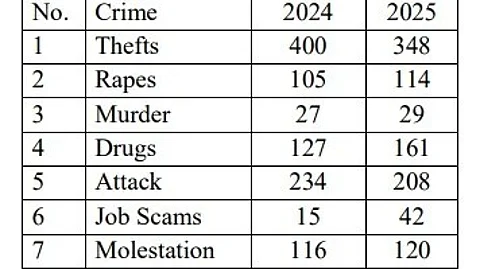

Goa has recorded a dramatic spike in job scams, with reported cases almost tripling in a year — from 15 in 2023-24 to 42 in 2024-25 — according to official crime statistics tabled in the Assembly.
The data also shows increases in other serious offences: rape cases rose from 105 to 114, murders from 27 to 29, and drug-related crimes from 127 to 161. Molestation complaints inched up from 116 to 120. While theft and assault cases declined, the overall rise in organised fraud and violent crimes underscores ongoing challenges for law enforcement.
In response, police have intensified 24×7 patrolling using PCR vans and foot patrols, strengthened beat-level intelligence gathering, and set up Women Help Desks in police stations. Forensic evidence collection has been made mandatory for serious crimes, supported by advanced training for investigators in cyber forensics, digital evidence handling, interrogation techniques, and legal procedures.
The Crime and Criminal Tracking Network System (CCTNS) and Inter-operable Criminal Justice System (ICJS) are being actively used for real-time data sharing. A dedicated cybercrime helpline (1930) and an AI-ML laboratory are operational to bolster investigative capacity.
Security in the coastal belt has been tightened with round-the-clock beach patrols, extra weekend deployments, plainclothes officers in high-footfall tourist zones, and safety signage at beach entry points.
Anti-narcotics operations include increased patrolling, mobilisation of local informants, and awareness drives in schools, colleges, public transport hubs, and community spaces to disrupt trafficking and dismantle its financial networks.
A 24×7 Senior Citizen Helpline (1090) operates from the State Police Control Room, supported by 53 PCR vehicles — including Pink Force units dedicated to women’s safety — with plans to add more vehicles. Cyber safety programmes are also being conducted in educational institutions and workplaces to combat phishing, online scams, and other digital crimes.